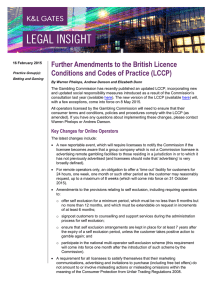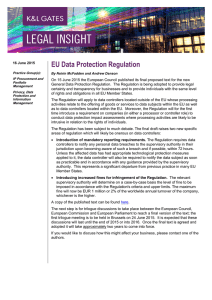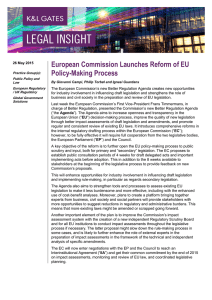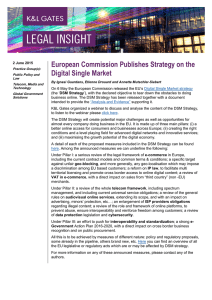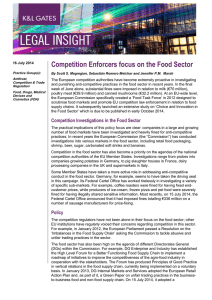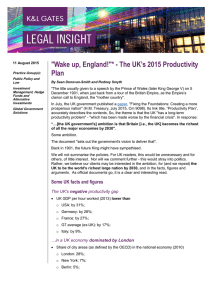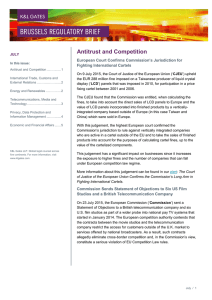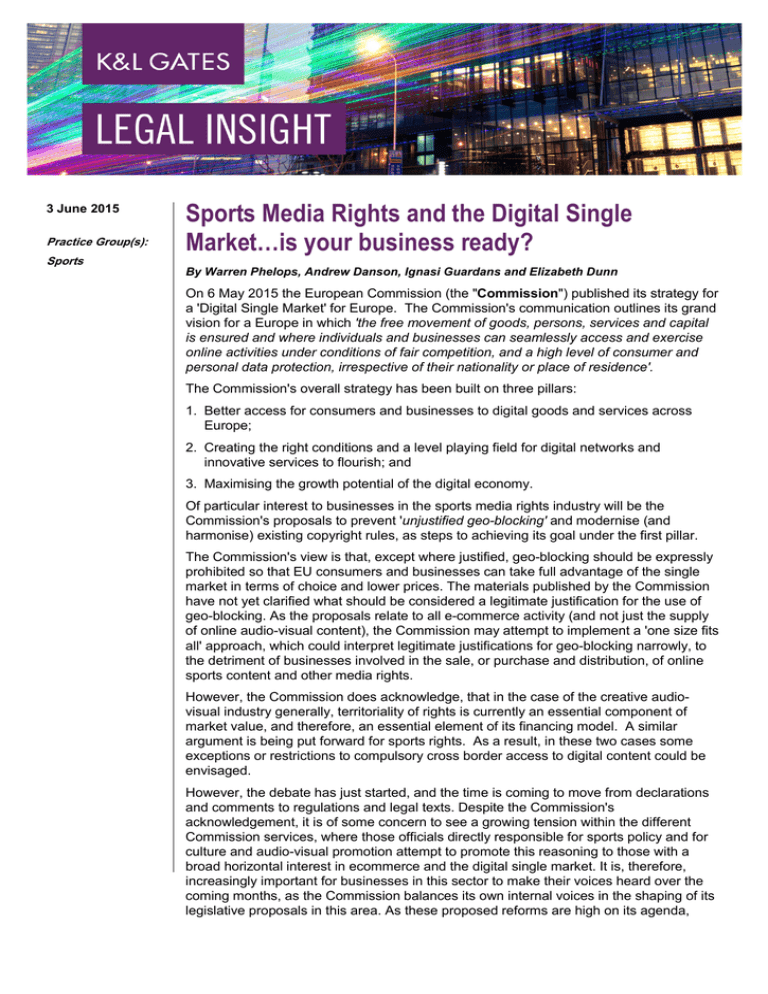
3 June 2015
Practice Group(s):
Sports
Sports Media Rights and the Digital Single
Market…is your business ready?
By Warren Phelops, Andrew Danson, Ignasi Guardans and Elizabeth Dunn
On 6 May 2015 the European Commission (the "Commission") published its strategy for
a 'Digital Single Market' for Europe. The Commission's communication outlines its grand
vision for a Europe in which 'the free movement of goods, persons, services and capital
is ensured and where individuals and businesses can seamlessly access and exercise
online activities under conditions of fair competition, and a high level of consumer and
personal data protection, irrespective of their nationality or place of residence'.
The Commission's overall strategy has been built on three pillars:
1. Better access for consumers and businesses to digital goods and services across
Europe;
2. Creating the right conditions and a level playing field for digital networks and
innovative services to flourish; and
3. Maximising the growth potential of the digital economy.
Of particular interest to businesses in the sports media rights industry will be the
Commission's proposals to prevent 'unjustified geo-blocking' and modernise (and
harmonise) existing copyright rules, as steps to achieving its goal under the first pillar.
The Commission's view is that, except where justified, geo-blocking should be expressly
prohibited so that EU consumers and businesses can take full advantage of the single
market in terms of choice and lower prices. The materials published by the Commission
have not yet clarified what should be considered a legitimate justification for the use of
geo-blocking. As the proposals relate to all e-commerce activity (and not just the supply
of online audio-visual content), the Commission may attempt to implement a 'one size fits
all' approach, which could interpret legitimate justifications for geo-blocking narrowly, to
the detriment of businesses involved in the sale, or purchase and distribution, of online
sports content and other media rights.
However, the Commission does acknowledge, that in the case of the creative audiovisual industry generally, territoriality of rights is currently an essential component of
market value, and therefore, an essential element of its financing model. A similar
argument is being put forward for sports rights. As a result, in these two cases some
exceptions or restrictions to compulsory cross border access to digital content could be
envisaged.
However, the debate has just started, and the time is coming to move from declarations
and comments to regulations and legal texts. Despite the Commission's
acknowledgement, it is of some concern to see a growing tension within the different
Commission services, where those officials directly responsible for sports policy and for
culture and audio-visual promotion attempt to promote this reasoning to those with a
broad horizontal interest in ecommerce and the digital single market. It is, therefore,
increasingly important for businesses in this sector to make their voices heard over the
coming months, as the Commission balances its own internal voices in the shaping of its
legislative proposals in this area. As these proposed reforms are high on its agenda,
Sports Media Right and the Digital Single Market…is
your business ready?
those relating to copyright modernisation are expected by the end of this year, with geoblocking proposals set to be published in early 2016.
If you would like to discuss with us how the Commission's strategy may impact your
business, please contact one of the authors.
Authors:
Warren Phelops
Warren.Phelops@klgates.com
+44.(0).20.7360.8129
Andrew Danson
Andrew.Danson@klgates.com
+44.(0).20.7360.8153
Ignasi Guardans
Ignasi.Guardans@klgates.com
+32.(0)2.336.1949
Elizabeth Dunn
Elizabeth.Dunn@klgates.com
+44.(0).20.7360.8256
Anchorage Austin Beijing Berlin Boston Brisbane Brussels Charleston Charlotte Chicago Dallas Doha Dubai Fort Worth Frankfurt
Harrisburg Hong Kong Houston London Los Angeles Melbourne Miami Milan Moscow Newark New York Orange County Palo Alto
Paris Perth Pittsburgh Portland Raleigh Research Triangle Park San Francisco São Paulo Seattle Seoul Shanghai Singapore
Spokane Sydney Taipei Tokyo Warsaw Washington, D.C. Wilmington
K&L Gates comprises more than 2,000 lawyers globally who practice in fully integrated offices located on five
continents. The firm represents leading multinational corporations, growth and middle-market companies,
capital markets participants and entrepreneurs in every major industry group as well as public sector entities,
educational institutions, philanthropic organizations and individuals. For more information about K&L Gates or
its locations, practices and registrations, visit www.klgates.com.
This publication is for informational purposes and does not contain or convey legal advice. The information herein should not be used or relied upon
in regard to any particular facts or circumstances without first consulting a lawyer.
© 2015 K&L Gates LLP. All Rights Reserved.
2

